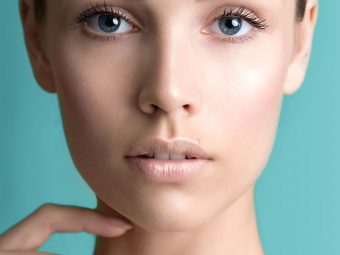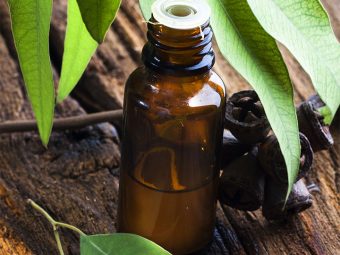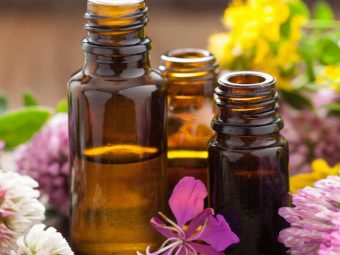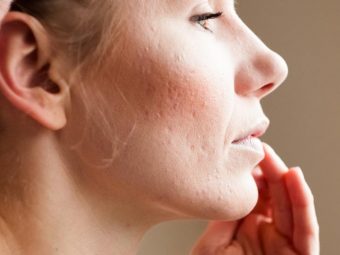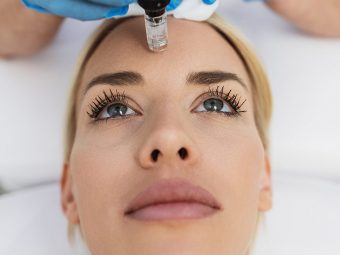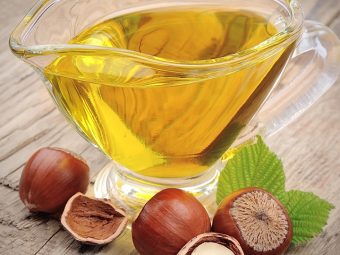Black Seed Oil Benefits For Skin, How To Apply, & Side Effects
Utilize the anti-inflammatory, antioxidant, and anti-microbial properties of this oil.
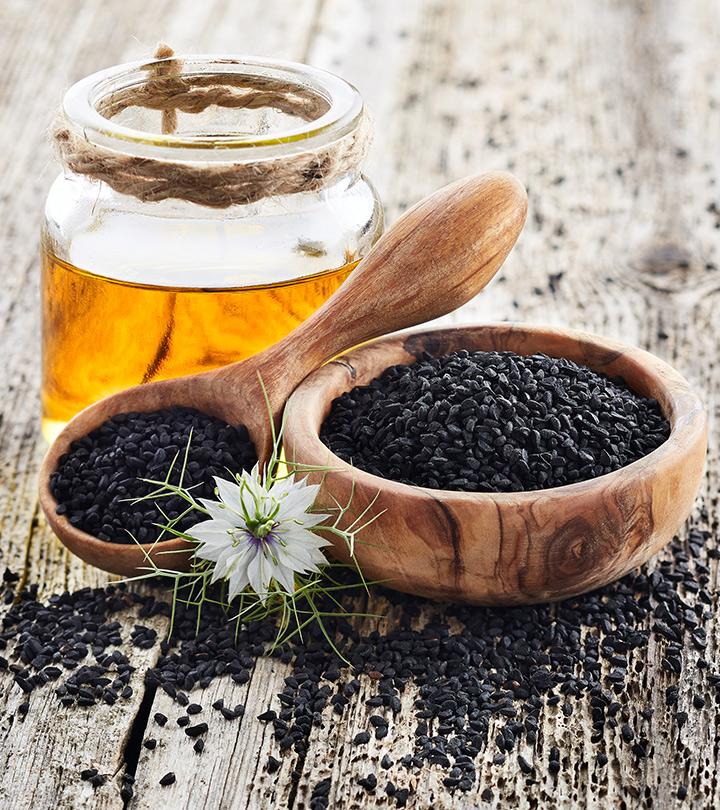
Black cumin seed oil, popularly known as black seed oil, has long been used in Asian and Middle Eastern skin care regimens (particularly in India). In addition, it was widely utilized by Egyptian royals such as Nefertiti and Cleopatra for its therapeutic and skin care benefits. The advantages of black seed oil for skin are numerous.
Black seed extracts are beneficial due to their anti-inflammatory, antibacterial, antioxidant, and anti-cancer characteristics (1). This article will explain what it can do for your skin, the hazards it may pose, and how to use this traditional beauty oil in your skin care regimen. Let’s get started!
In This Article
What Is Black Seed Oil?
The seeds of Nigella sativa plant are commonly known as black seeds or black cumin seeds. This annual flowering herb belongs to the Ranunculaceae family, native to the bordering areas of the Mediterranean sea, India, and Pakistan (1). It is widely used in traditional folk medicine and also as a food preservative and spice. The seeds are also called black caraway seeds, kalonji, fennel flower, and habbat al baraka (meaning ‘blessed seed’ described by the Prophet Mohammed).
The oil prepared by compressing the seeds (cold-pressed) is identified as having curative properties, as described by Hippocrates and Dioscorides. Black cumin seed oil has a diverse chemical composition and is rich in proteins, minerals, amino acids, and nigellone, a compound with antihistaminic properties.
This precious oil from the East has intrigued the Western beauty industry. Many are turning to this ingredient for its skin healing properties. Let’s take a look at why you should also consider including black seed oil in your skin care routine.
Benefits Of Black Seed Oil For Skin
1. May Heal Acne
Black seed oil contains thymohydroquinone, a compound with high activity against gram-positive microbes, especially Staphylococcus aureus, the acne-causing bacteria (2). It also works well with popular antibiotics like doxycycline, erythromycin, ampicillin, and tobramycin in reducing pustular skin infections caused by staphylococcus bacteria.
Using black cumin seed oil on the skin can heal papules, pustules, and other forms of acne.
2. Has Anti-Inflammatory Properties
Black cumin seed oil can heal and manage inflammatory skin conditions like psoriasis and eczema (2). It can reduce skin inflammation, irritation, redness, and the appearance of plaques associated with these conditions. An animal study confirmed that 95% ethanolic extract of black cumin seed has antipsoriatic activities and can manage psoriasis (3).
3. Reduces Signs Of Aging
Topical application of black cumin seed oil reduces skin irritation and improves skin hydration levels and skin barrier function (2). It is loaded with antioxidants, which can reduce oxidative stress. All these effects can keep the skin plump and healthy and diminish premature aging signs like fine lines and wrinkles. Its antioxidant properties may also help reduce dark spots and discoloration.
The skin barrier protective properties of black cumin seed oil make it an excellent choice for taking care of your skin. Here is how you can use it.
How To Apply It On The Skin
Black seed oil is cold-pressed and can be used as a carrier oil. Before using it, do a patch test to prevent the risk of allergic reactions. Follow these guidelines to use black cumin seed oil for your skin:
1. As A Facial Oil
- Cleanse your skin and pat it dry.
- Massage your face and neck with a few drops of black seed oil.
- Leave it on overnight.
The black seed oil has a strong fragrance. If it is too sensitive for your nose, you can follow this method:
2. Combine With Other Ingredients
- Combine 2-3 drops of black seed oil with your favorite facial oil, cream, or lotion.
- Massage your face and neck with the blend.
- Leave it on overnight.
3. As The Last Step Of Your Skin Care Routine
You can use black seed oil as the last step of your skin care routine to lock in hydration. Use it after applying serum, essence, night cream, or any other product.
Are there any risks of using black seed oil for the skin? Let us understand in the next section.
Side Effects And Risks
There is not much research about the side effects of topical application of black cumin seed oil. Hence, it is better to do a patch test before using it as it may cause:
- Allergic reactions
- Redness
- Itching
- Irritation
- Hives
Also, if you are pregnant or breastfeeding, avoid using black seed oil as its effects are still unknown, and it may cause sensitivity.
Facials are one of the best ways to rejuvenate your skin, boost blood circulation, and promote lymphatic drainage. It may also help manage wrinkles, sagging skin, and fine lines and have many other benefits. However, you should also maintain a gap between the sessions and allow your skin to regenerate itself. The frequency may differ depending on your age, skin type, and condition. You may consult a trained aesthetician or a dermatologist to determine the ideal frequency of facial massages or stick to the once-a-month routine.
Frequently Asked Questions
Does black seed oil make your skin glow?
Possibly. Black seed oil helps nourish your skin, boosts its hydration, and adds radiance to it.
Does black seed oil grow facial hair?
Possibly. It has been suggested that black seed can nourish your skin, as well as create a nurturing environment for your facial hair to grow. But there is no scientific evidence to prove the same.
Can black seed oil remove stretch marks?
Possibly. Black seed oil is packed with beneficial nutrients like antioxidants and anti-inflammatory agents that may help boost skin rejuvenation and reduce stretch marks. But there is no scientific evidence to prove the same.
Does black seed oil darken skin?
Possibly. Studies have shown that the thymoquinone found in black seed oil can help solve skin problems such as the decline in skin pigmentation and vitiligo as it increases the intensity of melanin (4).
Key Takeaways
- Black cumin seed oil is rich in proteins, minerals, amino acids, and nigellone.
- It is loaded with anti-inflammatory and antioxidant properties.
- Black cumin oil helps heal acne and reduce the signs of aging.
- However, it is better to avoid the oil if you are pregnant or breastfeeding.
Sources
Articles on StyleCraze are backed by verified information from peer-reviewed and academic research papers, reputed organizations, research institutions, and medical associations to ensure accuracy and relevance. Read our editorial policy to learn more.
- The medicinal potential of black seed (Nigella sativa) and its components
https://www.researchgate.net/publication/223809080_The_medicinal_potential_of_black_seed_Nigella_sativa_and_its_components - Dermatological effects of Nigella sativa
https://www.sciencedirect.com/science/article/pii/S2352241015000286?via%3Dihub - Antipsoriatic activity and cytotoxicity of ethanolic extract of Nigella sativa seeds
https://www.ncbi.nlm.nih.gov/pmc/articles/PMC3785163/ - A Review on the Cosmeceutical and External Applications of Nigella sativa
https://www.ncbi.nlm.nih.gov/pmc/articles/PMC5735686/
Thank you for creating with WordPress.Version 5.9.2
Recommended Articles
- Benefits Of Pumpkin Seed Oil For The Skin
- Meadowfoam Seed Oil What Are Its Benefits And Uses
- Why Use Black Seed Oil For Skin? Uncovering The Benefits And Side Effects
- Is Hemp Oil Good For Your Skin?
- Safflower Oil For Skin: Benefits, Usage, And Side Effects




